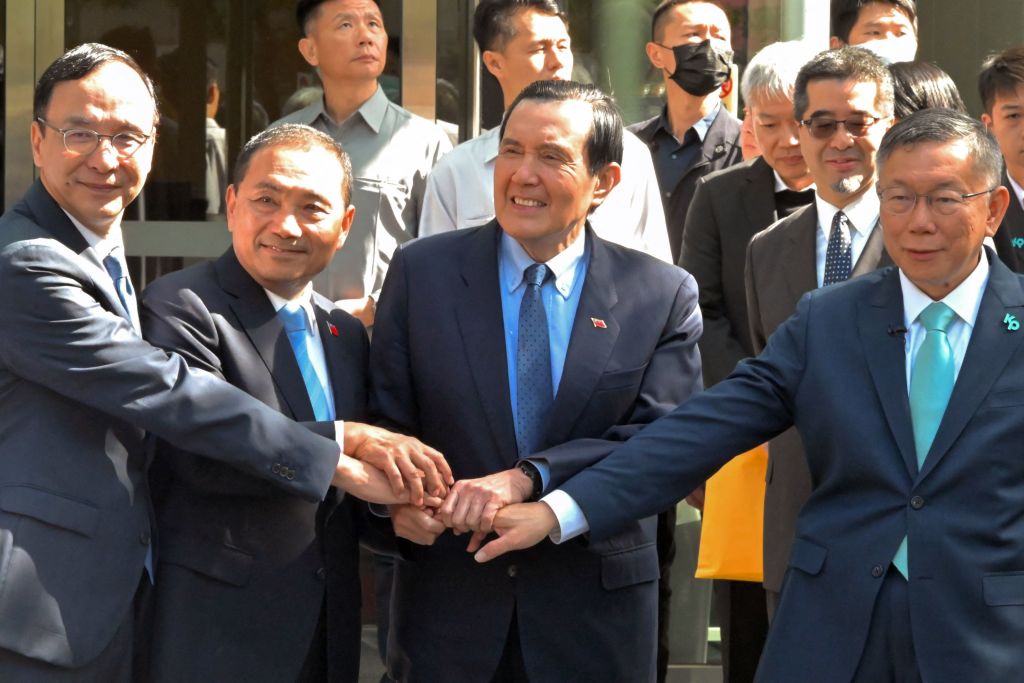
A hastily assembled press briefing at Taipei’s Grand Hyatt Hotel descended into chaos on Thursday evening, as some of Taiwan’s most recognizable political figures bickered in front of reporters and millions of viewers on live television, hurling playground insults and reading private text messages aloud.
The acrimonious meeting, an eleventh-hour attempt at cobbling together a previously promised alliance for the upcoming presidential election in January, ended with the main opposition party Kuomintang (KMT) walking out of the venue. By Friday’s deadline to register their candidacy, the opposition parties had officially gone their separate ways.
Ko Wen-je from the Taiwan People’s Party (TPP) registered his bid with lawmaker Wu Hsin-ying as his vice presidential running mate, and the KMT’s Hou Yu-ih partnered with media personality Jaw Shaw-kong. (Meanwhile, Foxconn founder Terry Gou, who had launched an independent campaign in August, said on Friday that he was dropping out of the race and expressed his hopes for an opposition victory.)
The dramatic falling out marks the collapse of a short-lived Beijing-friendly alliance that, after it was announced on Nov. 15, many speculated may have been a threat to the ruling Democratic Progressive Party and its presidential nominee William Lai Ching-te, who is the current vice president and has been leading the polls for much of the year. The upcoming Taiwan election is widely considered to be one of the most consequential for the self-governing island’s relationship with mainland China, regional stability, and the already turbulent U.S.-China rivalry.
Read More: Why Protecting Taiwan Really Matters to the U.S.
The TPP and KMT threatened to shake up the race last week when they agreed to put their two strongest candidates—based on opinion polls—on a joint ticket. But tensions quickly surfaced and discussions spiraled in the following days over how to interpret opinion polling and who should be nominated.
Hou, the KMT’s presidential nominee, said on Tuesday that he was determined to cooperate with the TPP’s Ko, even if it meant running as a vice presidential candidate, and would wait “until the last minute” for him. But the parties’ political divisions proved irreconcilable, and observers say their separate tickets are set to dilute opposition votes in the upcoming election.
“I think collapse of the alliance is likely to consolidate both the KMT’s and the TPP’s vote base on the one hand, as intensified conflicts usually can promote vote base consolidation and unity,” Qi Dongtao, a senior research fellow at the National University of Singapore’s East Asian Institute, tells TIME. “On the other hand, swing voters who have no stable identification with either party will be less likely to vote for [either of] them.”
The very public disintegration of the alliance has already become a talking point for Lai’s campaign: “Should we dare to hand over the business of running the country to these people?” the DPP candidate questioned at a campaign event on Thursday.
The DPP, which has strongly advocated for an independent Taiwanese national identity, is loathed by Beijing, which claims the island as part of China’s territory.
As speculations of a Chinese invasion of Taiwan have bubbled for years, Chinese President Xi Jinping and his ruling Chinese Communist Party have made clear that they’re closely following Taiwan’s upcoming election and would prefer to unify politically—but haven’t ruled out force.
Read More: Both Wary of War, Taiwan’s Voters Eye China and China Eyes Taiwan’s Voters
“Look, peace is all well and good,” a senior U.S. official quoted Xi as saying when the Chinese leader met President Joe Biden last week in San Francisco, “but at some point we need to move toward resolution more generally.”
The official also told reporters that Xi had “underscored that this was the biggest, most potentially dangerous issue in U.S.-China relations,” and that while Xi noted Beijing’s preference for peaceful reunification, he “moved immediately to conditions that the potential use of force could be utilized.”
“For Beijing, the collapse of the alliance means it has to prepare to deal with a pro-independence hardliner administration in Taiwan in the coming four years or even longer period of time,” says Qi. “Peaceful unification will be more difficult to achieve; and military, economic, and diplomatic deterrence against Taiwan will be strengthened by Beijing.”
More Must-Reads From TIME
- The 100 Most Influential People of 2024
- Coco Gauff Is Playing for Herself Now
- Scenes From Pro-Palestinian Encampments Across U.S. Universities
- 6 Compliments That Land Every Time
- If You're Dating Right Now , You're Brave: Column
- The AI That Could Heal a Divided Internet
- Fallout Is a Brilliant Model for the Future of Video Game Adaptations
- Want Weekly Recs on What to Watch, Read, and More? Sign Up for Worth Your Time
Contact us at letters@time.com